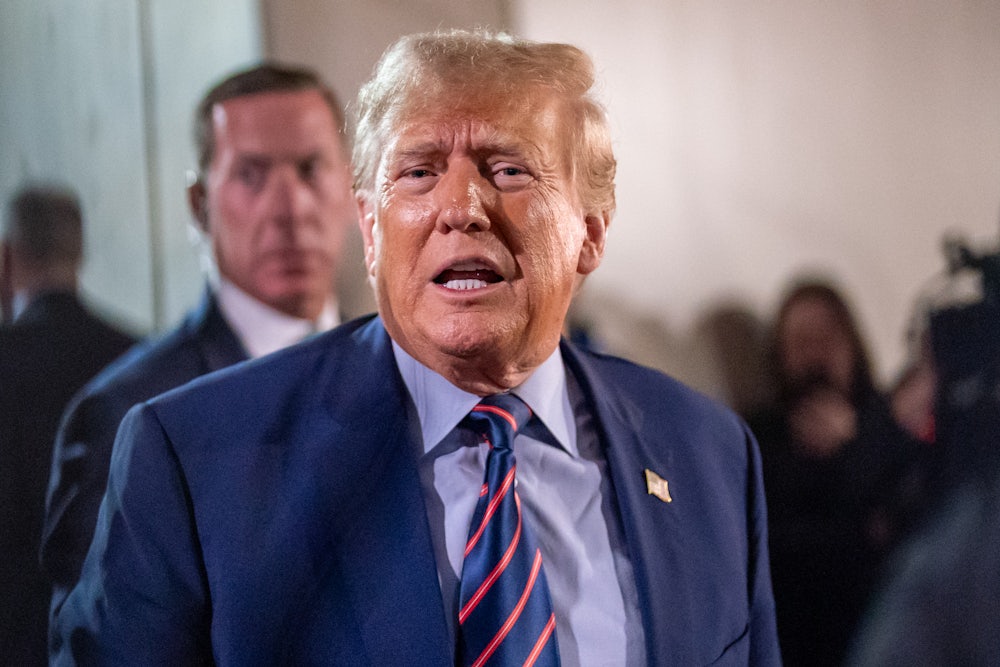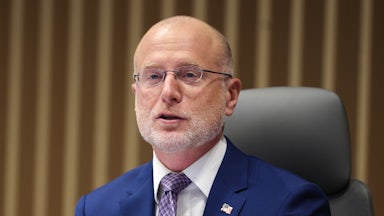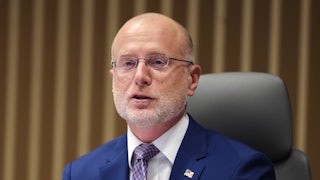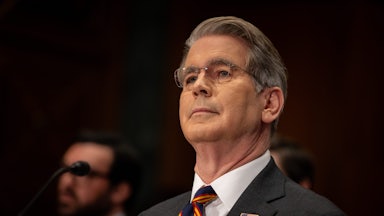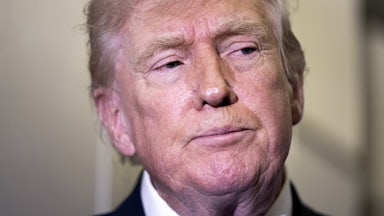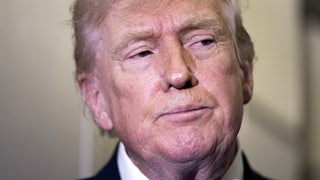A lot of people are talking about the long piece Robert Kagan wrote in The Washington Post on Thursday about how, as the headline put it, “A Trump dictatorship is increasingly inevitable. We should stop pretending.”
They’re talking about it, I think, for two main reasons. One, it’s interesting coming from Kagan, an influential neocon who has spent his career promoting a hard-line foreign policy. He hasn’t written regularly on such domestic topics as presidential elections, although people this week seem to have forgotten that he’s been a Donald Trump foe since 2016, when he endorsed Hillary Clinton and wrote a Post column warning, “This is how fascism comes to America.”
The second reason is that the piece is gripping, dark, and alarming. The sections on what a second Trump term would look like are terrifying (even if other liberal columnists, including me, have been saying similar things for years). But I want to draw attention to a different section of the piece, where he recounts the cowardice and indifference that enabled Trump’s rise and lays out how the deck is stacked in Trump’s favor as we hurtle toward the 2024 election.
I think Kagan tells a pretty one-sided story with respect to the stacked deck. But at the same time, he’s right about the complacency and shoulder-shrugging indifference that put Trump in the White House. And what’s shocking to me, what I puzzle over for at least a couple of hours every day, is this: After all we’ve seen from that man, how can it possibly be the case that we’re going to shrug our shoulders again? And yet, all signs suggest we are.
With respect to the stacked deck, Kagan writes that Trump “will enter the general-election campaign early next year with momentum, backed by growing political and financial resources, and an increasingly unified party,” and that the criminal proceedings will be a strength rather weakness: “He is going to use the trials to display his power.” No doubt Trump will try. But it’s hardly clear that this will work. If he’s convicted of at least one serious crime before Election Day, sure, that will galvanize his base, but will it really help him with swing voters? In a number of polls I’ve seen, Trump is under 50 percent among Republican-leaning independents. There’s also the question of Trump’s mental decline, which is becoming increasingly obvious and which the media will eventually cotton on to (and has, a bit). These and other facts don’t fit into the doomsday narratives, but they’re real. So there are a lot of balls that could bounce Joe Biden’s way that Kagan doesn’t mention.
Still, this much is dead-on true: “Throughout these years, an understandable if fatal psychology has been at work,” Kagan writes of the time since Trump’s rise. “At each stage, stopping Trump would have required extraordinary action by certain people, whether politicians or voters or donors, actions that did not align with their immediate interests or even merely their preferences.” And not enough people took such action. They “behaved normally,” as Kagan put it, either on the assumption (early on) that Trump would fade, or in the naïve faith that he couldn’t really be that bad, or out of sheer cowardice, or out of literal physical fear for their families (as Mitt Romney recently articulated to McKay Coppins).
The incredible thing to me is how it’s all happening again. Here are six culprits who seem to think this is just another election.
Republican donors and corporate titans: Maybe that’s two categories, but I’d call them 1A and 1B. Most of these people can’t possibly want Trump to return to the White House. They know who he is; they know what he’ll do. And yet, they really want their tax cuts. They really hate Biden’s love of unions and how his administration is trying to bust up monopolies and oligopolies. Is that more important to them than democracy? I fear the answer is a pretty unequivocal yes.
Middle-of-the-road voters: This is the chunk of the electorate that is not liberal but also not MAGA. From everything I can see, these voters just aren’t alarmed by Trump at all. I think they’re so cynical (and, let’s face it, not well informed in a lot of cases) that they think all politicians have some Trump in them; they all just want to make a buck, and so on. I understand their concerns about inflation and, more generally, just how hard their lives are (a topic for another column that I should write soon). But how they can see Trump as just another pol, albeit maybe a little more so, is something I can’t figure out.
No Labels: It looks like they’re forging ahead. The group’s leaders repeatedly insist that they don’t want to help Trump. And maybe they’ll put forward a candidate who might take votes from Trump—insider betting seems to be moving from Democrat Joe Manchin as the group’s standard-bearer to former Maryland GOP Governor Larry Hogan. But the No Labels scenario for victory is a total fantasy, as No Labels CEO Nancy Jacobson surely knows, and this is no time for fantasy.
Robert F. Kennedy Jr.: Who knows what to say about this crackpot? Recent polls show him breaking 20 percent in a three-way presidential race. They also suggest he may take more from Trump than from Biden, which is fine. But he’s a highly unstable presence in a general election contest. Imagine him on a debate stage next October. Who is he going to go after harder, Trump or Biden?
Cornel West: His may be the most irresponsible candidacy of all, because as he well knows, the only impact he can possibly have on this race is to win the votes of a few thousand young voters in a handful of states and thus help Trump win those states.
Jill Stein: She formally announced her Green Party candidacy recently. We shouldn’t expect more from Vladimir Putin’s dinner guest. She already helped put Trump in the White House once, so why shouldn’t she do it again?
In sum, here’s where we are. One of two people, and only two people, is going to be president on January 20, 2025. You can wish Biden had stood down. Nearly a year ago, I wrote a strong endorsement of him running again. But he has aged in that year. I might now say that on balance, he should have stood down at some point in the summer.
But he didn’t. And that’s that. He may not be fully up to the job by 2027 or whatever, but here are some things he won’t do: He won’t appoint lackeys based on loyalty. He won’t bomb Mexico. He won’t arrest political opponents. He won’t invoke the Insurrection Act to have protesters arrested. He won’t give Putin Ukraine. And we can know to a certainty that he won’t try to make himself president for life.
Donald Trump might do all those things and a whole lot more. And yet, all six of those people and groups I listed above think this is a fine time to ignore all this and/or run a pipe-dream candidacy for president.
I can almost understand in retrospect how Trump got elected in 2016. He was an outsider then, moderate voters had been instructed for 25 years to hate Hillary, and he drew a narrow inside straight. But now, eight years and multiple offenses against democracy later, we’re really going to sleepwalk our way to a Trump presidency again?
To borrow from Kagan, we need people to do extraordinary things. If now is not the time, when will be?
